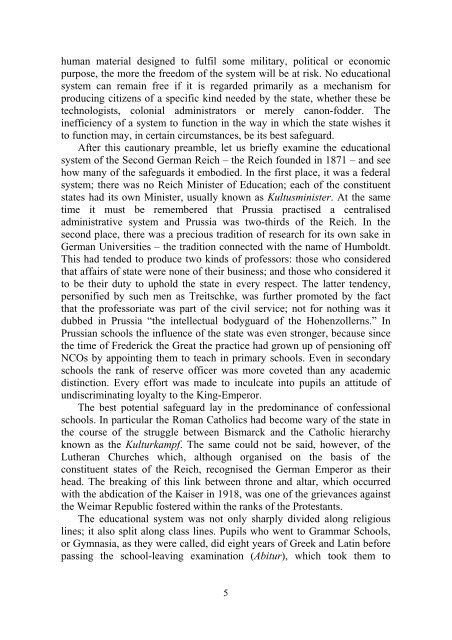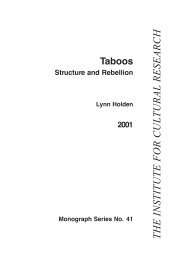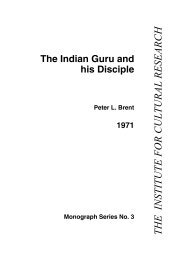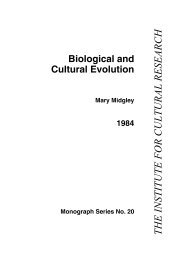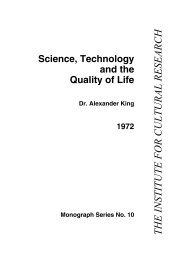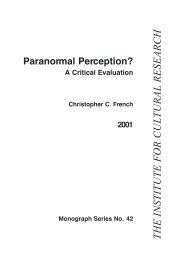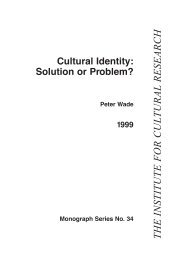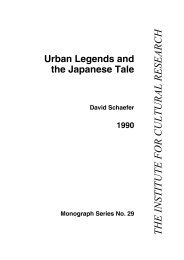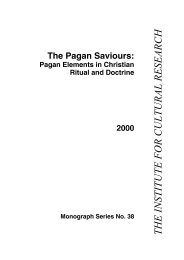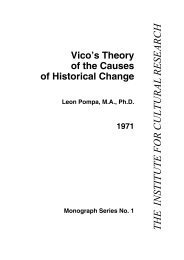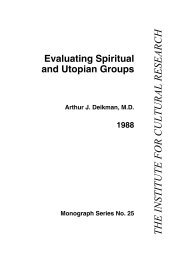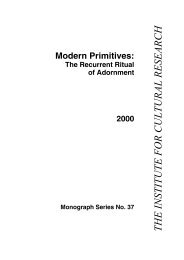Education and Elitism in Nazi Germany - The Institute For Cultural ...
Education and Elitism in Nazi Germany - The Institute For Cultural ...
Education and Elitism in Nazi Germany - The Institute For Cultural ...
You also want an ePaper? Increase the reach of your titles
YUMPU automatically turns print PDFs into web optimized ePapers that Google loves.
human material designed to fulfil some military, political or economic<br />
purpose, the more the freedom of the system will be at risk. No educational<br />
system can rema<strong>in</strong> free if it is regarded primarily as a mechanism for<br />
produc<strong>in</strong>g citizens of a specific k<strong>in</strong>d needed by the state, whether these be<br />
technologists, colonial adm<strong>in</strong>istrators or merely canon-fodder. <strong>The</strong><br />
<strong>in</strong>efficiency of a system to function <strong>in</strong> the way <strong>in</strong> which the state wishes it<br />
to function may, <strong>in</strong> certa<strong>in</strong> circumstances, be its best safeguard.<br />
After this cautionary preamble, let us briefly exam<strong>in</strong>e the educational<br />
system of the Second German Reich – the Reich founded <strong>in</strong> 1871 – <strong>and</strong> see<br />
how many of the safeguards it embodied. In the first place, it was a federal<br />
system; there was no Reich M<strong>in</strong>ister of <strong>Education</strong>; each of the constituent<br />
states had its own M<strong>in</strong>ister, usually known as Kultusm<strong>in</strong>ister. At the same<br />
time it must be remembered that Prussia practised a centralised<br />
adm<strong>in</strong>istrative system <strong>and</strong> Prussia was two-thirds of the Reich. In the<br />
second place, there was a precious tradition of research for its own sake <strong>in</strong><br />
German Universities – the tradition connected with the name of Humboldt.<br />
This had tended to produce two k<strong>in</strong>ds of professors: those who considered<br />
that affairs of state were none of their bus<strong>in</strong>ess; <strong>and</strong> those who considered it<br />
to be their duty to uphold the state <strong>in</strong> every respect. <strong>The</strong> latter tendency,<br />
personified by such men as Treitschke, was further promoted by the fact<br />
that the professoriate was part of the civil service; not for noth<strong>in</strong>g was it<br />
dubbed <strong>in</strong> Prussia “the <strong>in</strong>tellectual bodyguard of the Hohenzollerns.” In<br />
Prussian schools the <strong>in</strong>fluence of the state was even stronger, because s<strong>in</strong>ce<br />
the time of Frederick the Great the practice had grown up of pension<strong>in</strong>g off<br />
NCOs by appo<strong>in</strong>t<strong>in</strong>g them to teach <strong>in</strong> primary schools. Even <strong>in</strong> secondary<br />
schools the rank of reserve officer was more coveted than any academic<br />
dist<strong>in</strong>ction. Every effort was made to <strong>in</strong>culcate <strong>in</strong>to pupils an attitude of<br />
undiscrim<strong>in</strong>at<strong>in</strong>g loyalty to the K<strong>in</strong>g-Emperor.<br />
<strong>The</strong> best potential safeguard lay <strong>in</strong> the predom<strong>in</strong>ance of confessional<br />
schools. In particular the Roman Catholics had become wary of the state <strong>in</strong><br />
the course of the struggle between Bismarck <strong>and</strong> the Catholic hierarchy<br />
known as the Kulturkampf. <strong>The</strong> same could not be said, however, of the<br />
Lutheran Churches which, although organised on the basis of the<br />
constituent states of the Reich, recognised the German Emperor as their<br />
head. <strong>The</strong> break<strong>in</strong>g of this l<strong>in</strong>k between throne <strong>and</strong> altar, which occurred<br />
with the abdication of the Kaiser <strong>in</strong> 1918, was one of the grievances aga<strong>in</strong>st<br />
the Weimar Republic fostered with<strong>in</strong> the ranks of the Protestants.<br />
<strong>The</strong> educational system was not only sharply divided along religious<br />
l<strong>in</strong>es; it also split along class l<strong>in</strong>es. Pupils who went to Grammar Schools,<br />
or Gymnasia, as they were called, did eight years of Greek <strong>and</strong> Lat<strong>in</strong> before<br />
pass<strong>in</strong>g the school-leav<strong>in</strong>g exam<strong>in</strong>ation (Abitur), which took them to<br />
5


